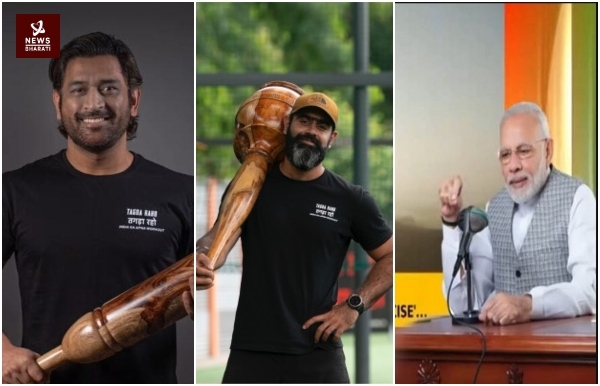Meet Rishabh Malhotra who revived traditional Indian workouts with 'Tagda Raho' startup
Rishabh Malhotra, founder of "Tagda Raho" has hit headlines after being mentioned by Prime Minister Narendra Modi in the latest episode of his radio show "Mann Ki Baat".
Rishabh Malhotra has hit headlines after being mentioned by Prime Minister Narendra Modi in the latest episode of his radio show 'Mann Ki Baat'. Notably, Rishabh Malhotra is the founder of the 'Tagda Raho' startup. The 36-year-old was praised by PM Modi for promoting fitness through traditional Indian exercise methods.

This Bengaluru-based fitness startup involves exercises with Gada (mace) and Mugdar (Indian club). Prior to this, this fitness startup came into limelight this year when former Indian team captain Mahendra Singh Dhoni showed interest and invested in it.
According to Rishabh, the idea behind the name of the startup 'Tagda Raho' is a salutation in the Assam Regiment, which is similar to how officers and soldiers greet each other in that unit. Instead of saying hello or namaste, they say 'Tagda Raho' to each other when they meet. This concept comes from there.
"I am trying to bring out the concept of our traditional exercises through the 'Tagda Raho' startup, which has been ongoing in the country's akhadas, in a modern way so that people in the cities can adopt them," Malhotra was quoted as saying to ANI.
Outlining the benefits his fitness startup could provide people, Malhotra said, "The first thing that happens when all your weight is on one side is that your posture improves and you open up. And when your posture opens up, your breathing improves. We are hunching so much that we don't realise the significant impact it's having on our lungs; our breathing is decreasing. So, this not only gives you strength and power, but it also brings a lot of change in your posture and your breathing."
Showing gratitude to PM Modi for bringing the nation's focus to his fitness startup, Malhotra said, "I am grateful that I got the opportunity to reach the nation through 'Mann Ki Baat' and introduce the 'Tagda Raho' startup."
Emphasizing the importance of embracing our traditional methods of exercising, 'Tagda Raho's founder stated, There's nothing wrong with going to the gym but what we have is better. The global fitness industry is not more than 150 years old. In India, the oldest gym that is still running is already 200 years old.
Speaking about Tagda Raho training module, Dhoni had said, "When I came across Tagda Raho, the concept appealed to me. Intrinsically Indian, the equipment used in the workout has been a part of traditional strength training and Tagda Raho has expertly innovated and adapted both the equipment and the movements in a modern avatar."
“Workout involves movements and an increased range of motion that activates several muscles that usually remain dormant, it focuses on your core, and stability and enhances your mobility. This is also excellent for athletes who are now looking at new forms of exercise to maintain their fitness levels and remain injury-free, ” Dhoni said.
The fitness startup said it has reinvented the “OG Indian Workout” by combining traditional equipment such as Indian clubs – the Gada, Mudgars, Vajra and Sumtola with a specially designed training regimen.
The equipment and training programme has been used by professional teams and institutions including the Lucknow Super Giants, Haryana Steelers, and the National Cricket Academy (NCA). The brand has also patented its modular equipment.
Rishabh aims to expand Tagda Raho's training dugouts across India and enter international markets, with a belief in the potential of Indian fitness practices to make a global impact.

What is Tagda Raho?
This Bengaluru-based fitness startup involves exercises with Gada (mace) and Mugdar (Indian club). Prior to this, this fitness startup came into limelight this year when former Indian team captain Mahendra Singh Dhoni showed interest and invested in it.
According to Rishabh, the idea behind the name of the startup 'Tagda Raho' is a salutation in the Assam Regiment, which is similar to how officers and soldiers greet each other in that unit. Instead of saying hello or namaste, they say 'Tagda Raho' to each other when they meet. This concept comes from there.
"I am trying to bring out the concept of our traditional exercises through the 'Tagda Raho' startup, which has been ongoing in the country's akhadas, in a modern way so that people in the cities can adopt them," Malhotra was quoted as saying to ANI.
Outlining the benefits his fitness startup could provide people, Malhotra said, "The first thing that happens when all your weight is on one side is that your posture improves and you open up. And when your posture opens up, your breathing improves. We are hunching so much that we don't realise the significant impact it's having on our lungs; our breathing is decreasing. So, this not only gives you strength and power, but it also brings a lot of change in your posture and your breathing."
Showing gratitude to PM Modi for bringing the nation's focus to his fitness startup, Malhotra said, "I am grateful that I got the opportunity to reach the nation through 'Mann Ki Baat' and introduce the 'Tagda Raho' startup."
Emphasizing the importance of embracing our traditional methods of exercising, 'Tagda Raho's founder stated, There's nothing wrong with going to the gym but what we have is better. The global fitness industry is not more than 150 years old. In India, the oldest gym that is still running is already 200 years old.
"There's nothing wrong with going to the gym, but before we blindly pick up things from everywhere, it's essential to see what resources we already have. If we don't recognise what we have, we'll end up circling back to the same things, waiting for someone from outside to tell us. Our country has such a large youth population that if we start accepting our things, we won't need to pick up anything from outside. It's not that what's happening outside is wrong, but what we have is better. The global fitness industry is not more than 150 years old. In India, the oldest gym that is still running is already 200 years old," Malhotra concluded.
Mixing Traditional in Modern Avatar Appealed to Me: Dhoni
Speaking about Tagda Raho training module, Dhoni had said, "When I came across Tagda Raho, the concept appealed to me. Intrinsically Indian, the equipment used in the workout has been a part of traditional strength training and Tagda Raho has expertly innovated and adapted both the equipment and the movements in a modern avatar."
“Workout involves movements and an increased range of motion that activates several muscles that usually remain dormant, it focuses on your core, and stability and enhances your mobility. This is also excellent for athletes who are now looking at new forms of exercise to maintain their fitness levels and remain injury-free, ” Dhoni said.
The fitness startup said it has reinvented the “OG Indian Workout” by combining traditional equipment such as Indian clubs – the Gada, Mudgars, Vajra and Sumtola with a specially designed training regimen.
The equipment and training programme has been used by professional teams and institutions including the Lucknow Super Giants, Haryana Steelers, and the National Cricket Academy (NCA). The brand has also patented its modular equipment.
Rishabh aims to expand Tagda Raho's training dugouts across India and enter international markets, with a belief in the potential of Indian fitness practices to make a global impact.
Total Views | 825






